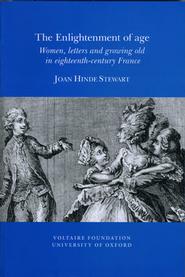
A new work by Hamilton College President Joan Hinde Stewart – The Enlightenment of age: Women, letters and growing old in eighteenth-century France – has been published by the Voltaire Foundation of the University of Oxford.
The book focuses on issues affecting aging and aged women in 18th-century France, as expressed in the prolific writings of four older women intellectuals of the period: Françoise de Graffigny, Marie Du Deffand, Marie Riccoboni and Isabelle de Charrière. Stewart, a scholar of 18th-century French literature, has a long familiarity with the women, about all of whom she has previously written and lectured.
Jonathan Mallinson, general editor at the Voltaire Foundation, called the book “…a work of the very highest scholarship. For the eighteenth century scholar, it is a book rich in new insights. … Other critics have reflected on questions of old age, and particularly death, in the eighteenth century, but nobody before Joan Stewart has looked at the question specifically from the perspective of women.”
“Part of my reason for concentrating on Graffigny, Du Deffand, Riccoboni and Charrière is that from each of them has come down to us a significant body of letters, often frank and intimate, and as gripping and complex as any good novel,” Stewart said. “Much of my book analyzes their astonishing letters and the courage it took to write them.”
Stewart’s book looks at the four French women’s experience of perceived decline and its implication for their physical, emotional and professional well-being during a time when all the available dignity of old age seemed to belong to men.
“If you think that our 21st-century culture emphasizes youth and physical attractiveness,” Stewart said, “you would be shocked by how much more rigid that cultural ideal was in the 18th century. An attractive old woman would have been an oxymoron.”
“The book,” Stewart continued, “is about infirmities and alterations of the body; about jealousy and quarrels; about death, dreams, literature and letter-writing. It is about the ways in which a group of older women claimed ownership of their lives.”
Fundamentally, Stewart said, “the book is about how, despite all the odds and all the pressures, some very determined women lived their lives to the fullest, and had a rich and fulfilling experience well into their final years. It is about how the act of writing enabled them, despite the reigning attitudes, to become fully themselves.”
“I never spent a boring moment with any of them,” she added.
Joan DeJean, writing in the Foreword for The Enlightenment of age, said Stewart’s work is “an eloquent reading of the observations left by the eighteenth-century French women writers who watched themselves growing old with the same acuity with which they observed the foibles of contemporary French society. This new history, as Stewart recreates it, is a far cry from the vision of women and aging that has been and too often still is dominant.” DeJean is the Trustee Professor of French in the Department of Romance Languages at the University of Pennsylvania. She also studies 18th-century French literature and the history of women’s writing in France.
Mallinson, the Voltaire Foundation editor and a professor at Trinity College, Oxford, said “this is a book written to be read, which has a reader in mind on every page – not just the eighteenth-century scholar, but the twenty-first century reader of all kinds.” He described the book as “scholarly, sensitive, stylish.”
“Joan Stewart,” Mallinson continued, “knows how to bring the past into the present, to look afresh at what may have seemed familiar, to examine critically and sensitively an often misleading or reductive image and to find the truth beneath; and she does so with style. These are all qualities which … scholars of the eighteenth century have long known and admired … in Joan Stewart.”
Stewart’s book evolved from a scholarly project she was pursuing when named Hamilton’s 19th president in May 2003. She returned to the project in earnest and completed the manuscript during a sabbatical in the spring of 2009.
Stewart came to Hamilton after serving four years as dean of liberal arts and professor of French at the University of South Carolina. She was previously at North Carolina State University from 1973 to 1999 as a member of the faculty and from 1985 to 1997 as chair of the Department of Foreign Languages and Literatures. Stewart also served as assistant dean for research and graduate programs for the College of Humanities and Social Sciences. She received the university’s outstanding teaching award.
Prior to joining the NC State faculty, Stewart taught at Wellesley College and Yale University, where she received her Ph.D. in 1970. She was an undergraduate at St. Joseph’s College, a small, private, liberal arts institution in New York City, from which she graduated summa cum laude in 1965.
In addition to books on 18th-century fiction and editions of several 18th-century novels, Stewart’s publications include a book on the French writer Colette and numerous articles, essays, chapters and book reviews. She is the recipient of fellowships from Yale University, the National Humanities Center and the National Endowment for the Humanities, and has been a fellow at the Université Paul Valéry in Montpellier, France, a visiting scholar at Oxford University in England, and a fellow at the Liguria Study Center for the Arts and Letters in Genoa, Italy.
As Hamilton’s president and professor of French, Stewart has co-taught a course on 18th-century literature. She has presided over a significant reinvestment in the college’s physical plant and shepherded policies intended to keep a Hamilton education accessible to qualified students with financial need. Most recently, the college announced its decision to become need-blind in admission, while retaining its pledge to meet the full demonstrated need of every accepted student.
